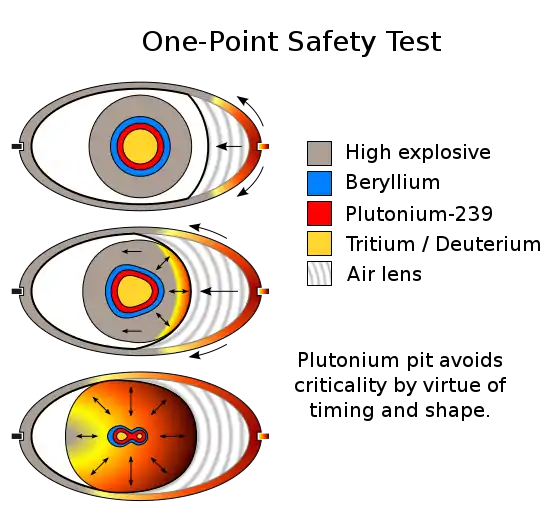Swan (nuclear primary)
Swan was a United States test nuclear explosive, which was developed into the XW-45 warhead.[1]
It was tested standalone on June 22, 1956 in shot Redwing Inca.[1] It was tested again as the primary of a thermonuclear device on July 2, 1956 in shot Redwing Mohawk.[2] Both tests were successful. It subsequently served as the primary in numerous thermonuclear devices during the 1950s.
Design features
The Swan device is the first design to incorporate a two-point ignition hollow-pit air-lens implosion assembly together with fusion boosting.
The Swan device had a yield of 15 kilotons,[1] weighed 105 lb (47.6 kg),[2] and had a (symmetrical) ovoid (non-prolate) shape with a diameter of 11.6 inches (29.5 cm) and a length of 22.8 inches (58 cm),[2] a length to diameter ratio of 1.97.[3]

The above schematic illustrates what were probably its essential features.
One-point safety
The Swan device has one-point safety designed into its structure. One-point safety is the ability to reliably avoid core fission when less than the full number of detonators are ignited, as the result of a crash, fire or impact. When only one of the two detonators of a Swan device is ignited, the core is imploded into two parts, neither of which achieves criticality.

The above schematics illustrate the essential features of this capability.
References
- http://nuclearweaponarchive.org/Usa/Tests/Redwing.html "Inca .. Yield: 15.2 kt. UCRL test of a multi-application boosted tactical nuclear warhead prototype named Swan. This design was later developed into the XW-45 warhead. The predicted yield was 10-15 kt."
- http://nuclearweaponarchive.org/Usa/Tests/Redwing.html "Mohawk. Yield: 360 kt This UCRL thermonuclear device used a boosted "Swan" primary and "Flute" secondary. The device was 15 inches in diameter, 46.2 inches long, and weighed 1116 lb. The primary was 11.6 inches by 22.8 inches and weighed 105 lb."
- L-D ratios of roughly 2.0 had a 100 percent success rate; greater than 2.0 provided no significant benefit, whereas significantly less than 2.0 had a significantly lower success rate; therefore this device class (two-point ignition, air-lens implosion, fusion-boosted) almost always employed an L-D ratio of about 2.0.